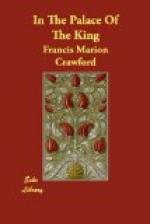He did not like the last sentence, for it placed him in an awkward position, as a man of honour, since he had already seen Dolores, and therefore could not under any circumstances agree to take advice contrary to which he had already acted. The most he could now say to the dwarf would be that he could give no answer and would act as carefully as possible. For the rest, the letter contained nothing treasonable, and was not at all what he had expected and believed it to be. It appeared to be written in a friendly spirit, and with the exception of his own brother and Mendoza, he was not aware that he had an enemy in Spain, in which he was almost right. Nevertheless, bold and frank as he was by nature, he knew enough of real warfare to distrust appearances. The writer was attached to the King’s person, or the letter might have been composed, and even written in an assumed hand, by the King himself, for Philip was not above using the methods of a common conspirator. The limitation of time set upon his prudence was strange, too. If he had not seen her and agreed to the terms, he would have supposed that Dolores was being kept out of his way during those two days, whereas in that time it would be possible to send her very far from Madrid, or to place her secretly in a convent where it would be impossible to find her. It flashed upon him that in shutting up Dolores that evening Mendoza had been obeying the King’s secret orders, as well as in telling her that she was to be taken to Las Huelgas at dawn. No one but Philip could have written the letter—only the dwarf’s fear of Philip’s displeasure could have made him so anxious that it should be read at once. It was all as clear as daylight now, and the King and Mendoza were acting together. The first letter had been brought by a woman, who must have got out through the window of the study, which was so low that she could almost have stepped from it to the terrace without springing. She had watched until the officers and the servants had gone out and the way was clear. Nothing could have been simpler or easier.
He would have burnt the letter at the lamp before the picture, had he not feared that some one might see him do it, and he folded it again and thrust it back under his doublet. His face was grave as he turned away, for the position, as he understood it, was a very desperate one. He had meant to send Dolores to Villagarcia, but it was almost impossible that such a matter should remain unknown, and in the face of the King’s personal opposition, it would probably ruin Quixada and his wife. He, on his side, might send Dolores to a convent, under an assumed name, and take her out again before she was found, and marry her. But that would be hard, too, for no places were more directly under the sovereign’s control than convents and monasteries. Somewhere she must go, for she could not possibly remain concealed in his study more than three or four hours.




